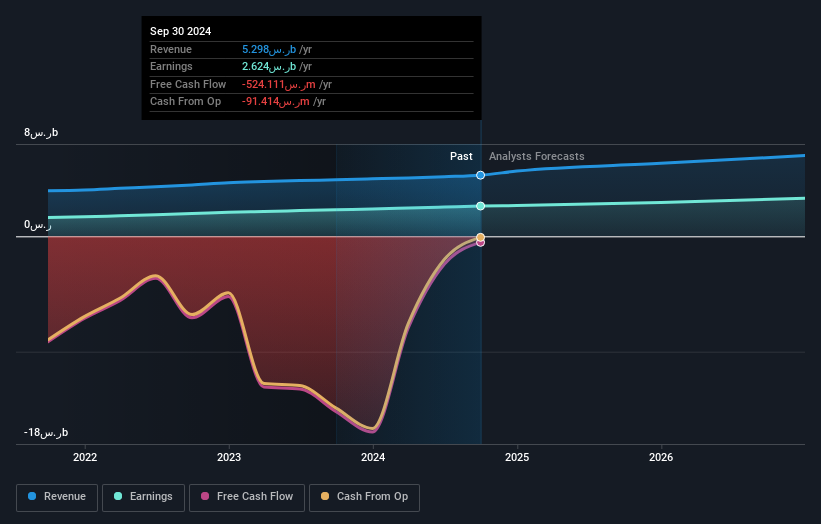- Saudi Arabia
- /
- Banks
- /
- SASE:1140
Private companies own 26% of Bank Albilad (TADAWUL:1140) shares but retail investors control 54% of the company

Key Insights
- Significant control over Bank Albilad by retail investors implies that the general public has more power to influence management and governance-related decisions
- The top 25 shareholders own 46% of the company
- Insider ownership in Bank Albilad is 15%
If you want to know who really controls Bank Albilad (TADAWUL:1140), then you'll have to look at the makeup of its share registry. With 54% stake, retail investors possess the maximum shares in the company. That is, the group stands to benefit the most if the stock rises (or lose the most if there is a downturn).
Private companies, on the other hand, account for 26% of the company's stockholders.
Let's take a closer look to see what the different types of shareholders can tell us about Bank Albilad.
Check out our latest analysis for Bank Albilad

What Does The Institutional Ownership Tell Us About Bank Albilad?
Many institutions measure their performance against an index that approximates the local market. So they usually pay more attention to companies that are included in major indices.
As you can see, institutional investors have a fair amount of stake in Bank Albilad. This suggests some credibility amongst professional investors. But we can't rely on that fact alone since institutions make bad investments sometimes, just like everyone does. It is not uncommon to see a big share price drop if two large institutional investors try to sell out of a stock at the same time. So it is worth checking the past earnings trajectory of Bank Albilad, (below). Of course, keep in mind that there are other factors to consider, too.

Bank Albilad is not owned by hedge funds. The company's largest shareholder is Mohammad I. Al Subaei & Sons Co, with ownership of 19%. For context, the second largest shareholder holds about 8.3% of the shares outstanding, followed by an ownership of 6.7% by the third-largest shareholder.
A deeper look at our ownership data shows that the top 25 shareholders collectively hold less than half of the register, suggesting a large group of small holders where no single shareholder has a majority.
While it makes sense to study institutional ownership data for a company, it also makes sense to study analyst sentiments to know which way the wind is blowing. Quite a few analysts cover the stock, so you could look into forecast growth quite easily.
Insider Ownership Of Bank Albilad
While the precise definition of an insider can be subjective, almost everyone considers board members to be insiders. The company management answer to the board and the latter should represent the interests of shareholders. Notably, sometimes top-level managers are on the board themselves.
I generally consider insider ownership to be a good thing. However, on some occasions it makes it more difficult for other shareholders to hold the board accountable for decisions.
Our information suggests that insiders maintain a significant holding in Bank Albilad. It has a market capitalization of just ر.س44b, and insiders have ر.س6.8b worth of shares in their own names. That's quite significant. Most would be pleased to see the board is investing alongside them. You may wish to access this free chart showing recent trading by insiders.
General Public Ownership
The general public -- including retail investors -- own 54% of Bank Albilad. This level of ownership gives investors from the wider public some power to sway key policy decisions such as board composition, executive compensation, and the dividend payout ratio.
Private Company Ownership
It seems that Private Companies own 26%, of the Bank Albilad stock. Private companies may be related parties. Sometimes insiders have an interest in a public company through a holding in a private company, rather than in their own capacity as an individual. While it's hard to draw any broad stroke conclusions, it is worth noting as an area for further research.
Next Steps:
While it is well worth considering the different groups that own a company, there are other factors that are even more important. Consider risks, for instance. Every company has them, and we've spotted 1 warning sign for Bank Albilad you should know about.
But ultimately it is the future, not the past, that will determine how well the owners of this business will do. Therefore we think it advisable to take a look at this free report showing whether analysts are predicting a brighter future.
NB: Figures in this article are calculated using data from the last twelve months, which refer to the 12-month period ending on the last date of the month the financial statement is dated. This may not be consistent with full year annual report figures.
Valuation is complex, but we're here to simplify it.
Discover if Bank Albilad might be undervalued or overvalued with our detailed analysis, featuring fair value estimates, potential risks, dividends, insider trades, and its financial condition.
Access Free AnalysisHave feedback on this article? Concerned about the content? Get in touch with us directly. Alternatively, email editorial-team (at) simplywallst.com.
This article by Simply Wall St is general in nature. We provide commentary based on historical data and analyst forecasts only using an unbiased methodology and our articles are not intended to be financial advice. It does not constitute a recommendation to buy or sell any stock, and does not take account of your objectives, or your financial situation. We aim to bring you long-term focused analysis driven by fundamental data. Note that our analysis may not factor in the latest price-sensitive company announcements or qualitative material. Simply Wall St has no position in any stocks mentioned.
About SASE:1140
Bank Albilad
Through its subsidiaries, provides various banking products and services in the Kingdom of Saudi Arabia.
Flawless balance sheet with solid track record and pays a dividend.

